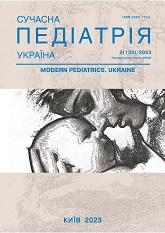Practical aspects of teaching of neonatology to students of the medical and psychological faculty
DOI:
https://doi.org/10.15574/SP.2023.130.121Keywords:
neonatology, medical psychology, medical trauma, newborn, medical and psychological assistanceAbstract
Purpose - to devote the main peculiarities of teaching neonatology to students of the medical and psychological faculty (MPF).
The main principles of distance learning are emphasized as problem-solving, interactivity and orientation on personal development. The advantages of problem-solving learning are declared; it helps students in the development of clinical thinking, of the ability to predict the occurrence of psychological problems, and develops optimal tactics in communication with parents and medical personnel.
In teaching the neonatology cycle to MPF students, special emphasis is placed on certain pathological conditions in newborns, which require psychological support for families. The need to provide comprehensive medical and psychological assistance to mothers, the effectiveness of which is based on key professional competencies and in-depth clinical knowledge, is emphasized.
A point is placed on the fact that in the process of training in neonatology, students of the MPF must understand their special role in preventing medical stress and medical trauma for both the child and the parents, since the environment of intensive neonatology contains numerous stress factors due to excessive sensory stimulation, such as light, sound and pain, which conflict with the requirements of the brain development of a newborn baby, especially in case of preterm birth. That is why it is important to providing complete information to the parents regarding the role of each member of the team of specialists in the organization of treatment and care of the child and the need to use developmental care that meets the needs of the early development of a premature child is also highlighted.
The role of the future medical psychologist in providing support to parents with perinatal loss is also determined. This problem affects many families, most of whom are dealing with their loss often alone without adequate support and help. The problem of perinatal losses and recovery of mothers and families after them is the competence of medical psychologists.
The underlined requirements for the teacher are the individual preparation of high-quality learning content, which may require additional time, but the involvement of the students themselves in the preparation of the necessary materials will even more increase the interactivity of the educational process. The possibilities of using the modern educational technologies are analyzed: these are «case technologies» in small groups, «business (role) games», an inverted classroom approach.
No conflict of interests was declared by the authors.
References
Caporali C et al. (2020). A global perspective on parental stress in the neonatal intensive care unit: a meta-analytic study. J Perinatol. 40 (12): 1739-1752. https://doi.org/10.1038/s41372-020-00798-6; PMid:32901116
DʼAgata AL et al. (2016). Infant Medical Trauma in the Neonatal Intensive Care Unit (IMTN): A Proposed Concept for Science and Practice. Adv Neonatal Care. 16 (4): 289-297. https://doi.org/10.1097/ANC.0000000000000309; PMid:27391564
Evertz K, Janus L, Linder R (eds.). (2021). Handbook of Prenatal and Perinatal Psychology. Integrating Research and Practice Springer Cham: 817. https://doi.org/10.1007/978-3-030-41716-1; PMCid:PMC8432112
Hew KF, Lo CK. (2018, Mar 15). Flipped classroom improves student learning in health professions education: a meta-analysis. BMC Med Educ. 18 (1): 38. https://doi.org/10.1186/s12909-018-1144-z; PMid:29544495 PMCid:PMC5855972
Kenner C, Altimier L, Boykova MV. (2019). Comprehensive Neonatal Nursing Care. Springer Publishing Company: 1100. https://doi.org/10.1891/9780826139146
Kurilina TV. (2016). Nejrorazvivayushchij uhod v usloviyah vysokotekhnologicheskogo okruzheniya. Ohrana materinstva i detstva. 1 (27): 94-99. URL: https://elib.vsmu.by/handle/123/11184.
Lukashenko AA. (2022). Synkhronna ta asynkhronna model osvitnoi diialnosti v umovakh voiennoho stanu v Ukraini (na prykladi pidhotovky zdobuvachiv vyshchoi osvity). Osvitnii protses v umovakh voiennoho stanu v Ukraini: materialy vseukrainskoho naukovo-pedahohichnoho pidvyshchennia kvalifikatsii. Odesa: Vydavnychyi dim «Helvetyka»: 283-286URL: https://www.google.com/url?sa=t&rct=j&q=&esrc=s&source=web&cd=&ved=2ahUKEwjY6vmKiqX-AhUN-yoKHYtpCGQQFnoECAsQAQ&url=https%3A%2F%2Fdspace.uzhnu.edu.ua%2Fjspui%2Fbitstream%2Flib%2F45275%2F1%2F%25D0%25A2%25D0%25B5%25D0%25B7%25D0%25B8%2520%25D0%25A1%25D0%25B0%25D0%25B2%25D0%25BA%25D0%25B0%252C%2520%25D0%25A1%25D0%25BB%25D0%25B8%25D0%25B2%25D0%25BA%25D0%25B0%25202021.pdf&usg=AOvVaw2ENRzh5Co23sqWq1LS3t_f.
Moskovko HS. (2016). Rozvytok klinichnoho myslennia u studentiv vyshchykh navchalnykh medychnykh zakladiv, yak kohnityvna skladova profesiinoi kompetentnosti. Bukovynskyi medychnyi visnyk. 20; 2 (78): 271-274. https://doi.org/10.24061/2413-0737.XX.2.78.2016.118
MOZ Ukrainy. (2013). Pro zatverdzhennia Polozhennia pro dystantsiine navchannia. Nakaz MOZ Ukrainy vid 25.04.2013 No. 466. URL: http://zakon2.rada.gov.ua/laws/show/z0703-13.3.
Mykhailovska NS, Oliinyk TV, Miniailenko LIe et al. (2018). Onlain-kursy yak skladova zmishanoho navchannia na klinichnykh kafedrakh. Naukovyi visnyk innovatsiinykh tekhnolohii. 2 (18): 5-17.
Ramnanan CJ, Pound LD. (2017). Advances in medical education and practice: student perceptions of the flipped classroom. Adv Med Educ Pract. 8: 63-73. https://doi.org/10.2147/AMEP.S109037; PMid:28144171 PMCid:PMC5245805
Riha OO, Penkov AYu. (2017). Navychky komunikatsii v pediatrychnii paliatyvnii dopomozi. Posibnyk dlia fakhivtsiv, yaki pratsiuiut z ditmy z nevylikovnymy zakhvoriuvanniamy. Kh.: Vodnyi spektr Dzhi-Em-Pi: 44.
Roghozina LA. (2017). Pedaghoghichni ideji D. Djjuji u svitli suchasnykh osvitnikh tendencij. Zbirnyk prac. Vinnycjkyj nacio-naljnyj tekhnichnyj universytet. URL: http://ir.lib.vntu.edu.ua/handle/123456789/17719.
The British Psychological Society. (2016). Perinatal Service Provision: The role of Perinatal Clinical Psychology. Briefing Paper No. 8. 40. URL: https://www.studocu.com/es/document/universidad-complutense-de-madrid/psicologia-clinica/briefing-paper-8-perinatal-service-provision-the-role-of-perinatal-clinical-psychology-2016/10763027.
Zhukova OA, Komyshan AI (zah red). (2021). Kompetentnisnyi pidkhid u vyshchii shkoli: teoriia ta praktyka. Monohrafiia. Kol. avt.; za zah. red. Zhukovoi OA, Komyshana AI. Kharkiv: KhNU imeni V.N. Karazina: 264. doi: 10.26565/9789662856729с.
Downloads
Published
Issue
Section
License
Copyright (c) 2023 Modern pediatrics. Ukraine

This work is licensed under a Creative Commons Attribution-NonCommercial 4.0 International License.
The policy of the Journal “MODERN PEDIATRICS. UKRAINE” is compatible with the vast majority of funders' of open access and self-archiving policies. The journal provides immediate open access route being convinced that everyone – not only scientists - can benefit from research results, and publishes articles exclusively under open access distribution, with a Creative Commons Attribution-Noncommercial 4.0 international license (СС BY-NC).
Authors transfer the copyright to the Journal “MODERN PEDIATRICS. UKRAINE” when the manuscript is accepted for publication. Authors declare that this manuscript has not been published nor is under simultaneous consideration for publication elsewhere. After publication, the articles become freely available on-line to the public.
Readers have the right to use, distribute, and reproduce articles in any medium, provided the articles and the journal are properly cited.
The use of published materials for commercial purposes is strongly prohibited.

